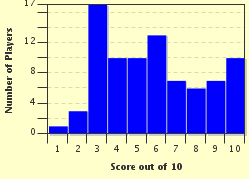Quiz Answer Key and Fun Facts
1. In the Old Testament, there are many verses that actually talk about objects and actions that God hates. Similarly, in Psalm 97:10, a person who loves God is told that he should hate what?
2. The first letter of John (John 1) says that anyone who hates his "brother" but says he loves God is a liar (4:20). But 1 John 3:15 (a previous verse) goes so far as to call the hateful person which?
3. Which book of the Bible includes a verse, which states that hate (or hatred) stirs up strife?
4. David had a son named Amnon. This son hated David's daughter so much that he raped her. There is more to the story than that, though. What was the name of Amnon's friend and cousin?
5. According to most translations of Malachi 1:3, who was "hated" by God?
6. Being cruel to someone or something can be hateful. Proverbs 12:10 says which about a wicked or cruel man?
7. Malachi 2:16 says that God hates divorce.
What metaphor does the Amplified Bible (AMP) translation use to describe a man being unfaithful and divorcing his wife?
8. "There is no worse form of hate than the refusal to lay your life down for your friends" is an exact verse from the Bible.
9. In Matthew 15:18-19, who proclaimed that things like wicked thoughts, murders, thefts, sexual immoralities, lies, and slanders are what defiles a person?
10. The Apostle Paul wrote in Mark 13:13, saying people would hate followers of Christ.
Source: Author
Ceduh
This quiz was reviewed by FunTrivia editor
agony before going online.
Any errors found in FunTrivia content are routinely corrected through our feedback system.

